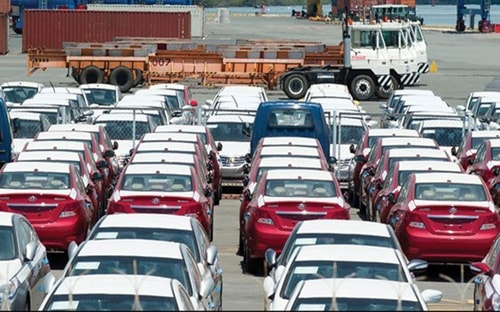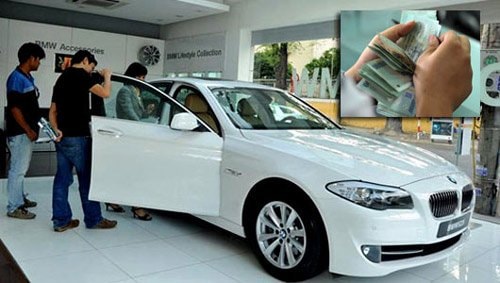Where will domestic car prices go?
The market is showing signs of slowing down due to the expectation that car prices will be cheaper when the import tax on completely built-up cars from the ASEAN region is reduced to 0%. However, contrary to this expectation, experts believe that car prices in 2018 will have little chance of decreasing further as car manufacturers have already reduced prices to the "bottom" in 2017.
According to the ASEAN Trade in Goods Agreement (ATIGA), the import tax rate for completely built-up (CBU) cars with a localization rate of over 40% from intra-bloc countries will be reduced to 0% from January 1, 2018. With this information, many consumers are hesitant to spend and are looking forward to cheaper car prices when import tax is reduced.
 |
| Import tax rate on completely built-up (CBU) cars with a localization rate of over 40% from intra-bloc countries will be reduced to 0% from January 1, 2018. |
Good time to buy a car at a cheap price
The closer the import tax is to 0%, the more difficult it becomes for car manufacturers to sell their products. To stimulate consumption, many car manufacturers have launched shocking discount programs since the beginning of 2017.
It can be seen that the auto market has never witnessed such a fierce price race as it does today. In recent months, auto manufacturers in Vietnam have continuously launched discount programs to stimulate consumer demand.
The price reduction war is getting more and more fierce when a series of mid-range car brands from countries such as: Korea, Japan or domestically assembled cars, imported cars have reduced prices up to several hundred million VND... but the sales situation is still not optimistic when sales up to the end of July have decreased slightly by 6% compared to the same period in 2016.
To complete business plans and stimulate year-end spending, recently, car companies continue to implement discount programs, with discounts ranging from 40-200 million VND, depending on the car company and model.
Specifically, Toyota Vietnam has just launched a discount promotion program for customers who buy Vios, Corolla Altis or Innova cars during the period until the end of August 2017 will receive incentives from 11 - 40 million VND...
In addition, other Toyota Vietnam models have also been heavily discounted by dealers, such as: Camry 2.5Q has a discount of 100 million VND, sold on the market for 1.283 billion VND, two other versions, Camry 2.0E and 2.5G, have the same discount of 90 million VND. Another Toyota model, Land Cruiser VX, has also been discounted by 130 million VND...
Not only Toyota, many car models of other car brands on the market are also adjusted to "shocking" price reductions by dealers, such as the Honda Odyssey model imported from Japan has been adjusted to reduce by up to 200 million VND, or the Honda CR-V has also been adjusted to reduce the price from 100-170 million VND.
Similarly at Mitsubishi, the Pajero 3.0 model also recorded a price reduction of up to 164 million VND, or the new Pajero Sport 4x2 AT gasoline engine version also adjusted down 106 million VND...
In July 2017, Ford Vietnam's Ford Everest model also adjusted the price down from 60 - 75 million VND/depending on the version... Or Chevrolet continued to reduce the price of the Colorado pickup truck to 80 million VND, while the remaining versions were reduced from 20-50 million VND.
One of the brands that has adjusted prices quite strongly since the beginning of the year is Mazda (a member of Truong Hai - Thaco), which also adjusted prices in July, with a reduction of 9 - 69 million VND/depending on the version.
In July 2017, Suzuki also joined the price reduction race when it reduced the price of the Vitara by up to 90 million VND, the remaining models of the company also reduced from 30 - 40 million VND...
Assessing that the domestic automobile market is going through a difficult period due to market impacts and customer psychology waiting for the time when import tax on cars from ASEAN to Vietnam will be 0% from January 2018, Mr. Bui Kim Kha, General Director of Thaco PC, said that car manufacturers have had to make great efforts to boost sales by offering many promotions and strong discounts since the beginning of the year.
“With many price reductions since the beginning of the year, Thaco's selling prices have now dropped to rock bottom. However, to stimulate customer demand, Thaco will launch more incentive programs for customers in the coming time,” Mr. Kha shared.
Looking at the recent market developments, the leader of a domestic auto joint venture shared that the prices of some car models are currently very attractive and are almost equivalent to the prices of cars in 2018.
 |
| The car market these days has many viewers, few buyers. Illustrative photo |
Sharing the same view, Mr. Choi Duk Jun, CEO of Mercedes-Benz Vietnam passenger cars, also said that import tax is not the only factor affecting car prices, but there are also special consumption tax, registration fees and pricing policies of each company...
Mr. Xavier Coiffard, General Director of Renault Vietnam, said: “With the current price, importers have reduced their profits to the maximum. Therefore, there is no way that the price can decrease further. In addition, in 2018, the registration fee for cars will increase, the cost of buying a car will be much higher. I think this is the most suitable time for customers to buy a car.”
Narrowing the price gap with the region
In reality, buying cheap cars with good quality is not only the desire of Vietnamese consumers but also the desire of consumers around the world.
In Vietnam, the automobile industry is still quite new, and the policies for developing the industry have not yet achieved the necessary stability. Experience from markets with developed automobile industries shows that, to develop the automobile industry, the industry's regulatory policies need to be stable and long-term so that manufacturers can confidently develop their businesses.
As assembly costs and taxes decrease, car prices will naturally decrease. At that time, the auto market will no longer be a battle for survival but will be a competition in price, quality and service to meet the increasingly demanding needs of customers.
Statistics show that domestic car production costs are currently about 20% higher than in the region. The main reason for the high production costs in Vietnam, as pointed out by manufacturers, is due to taxes and fees...
Therefore, to increase competitiveness and develop the domestic automobile industry, the Ministry of Industry and Trade has just reported to the Working Group on the Strategy for the Development of the Automobile Industry. In which 3 specific solutions are proposed.
First, is to create a large enough consumer market to encourage the use of domestic cars.
Second, there is a very strong support solution for domestic car assembly enterprises, including no special consumption tax on the domestically created value of cars.
Third, the Ministry of Industry and Trade proposed that the Government and the Ministry of Planning and Investment attract investment from multinational corporations to invest in large-scale projects in Vietnam, especially focusing on large corporations and car lines that do not have production facilities in the ASEAN region...
Impressed with the solutions proposed by the Ministry of Industry and Trade, especially those related to taxes, Mr. Choi Duk Jun said that not calculating special consumption tax on the value added created domestically will lead to more competitive car prices and stimulate the development of the automobile industry.
On the importer side, Mr. Xavier Coiffard pointed out that this is a strategic choice but will make it more difficult for Vietnamese customers to access imported cars. Because imported car brands such as Renault - a mid-range brand - will not be able to have a good price position in the market compared to domestically assembled cars.
Faced with this situation, importers must learn to adapt to the market through more effective management and more careful selection of car models to bring to the Vietnamese market.
To reduce the negative impacts of policy adjustments on importers, Mr. Xavier Coiffard suggested that the Government and relevant agencies should take measures to gradually adjust the market so that importers can adapt to market fluctuations.
According to Thanh Hai/vneconomy
| RELATED NEWS |
|---|

